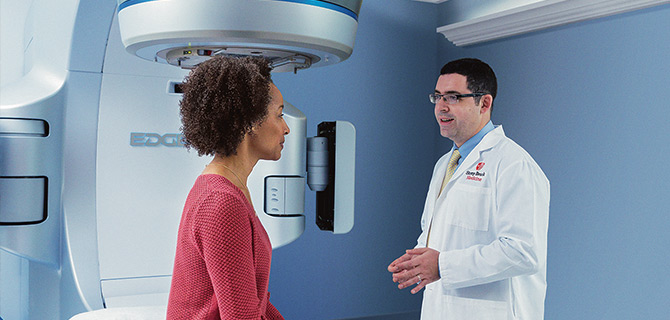RapidArc is a radiotherapy technology that is among the most advanced forms of intensity-modulated radiation therapy (IMRT). IMRT is a computer-based form of radiotherapy that allows radiation oncologists to send — in small multiple doses with precision — external beams in the 3D shape of tumors.
RapidArc uses computed tomography (CT) or other imaging technology to pinpoint a tumor. Then, the technology system uses this image to guide the radiation beam to the tumor in one or two rotations of the machine around the patient. During treatment, the radiation beam is shaped and reshaped as it continuously delivers beams at virtually every angle in a 360-degree revolution. In short, it allows us to deliver a high dose of radiation to kill or sterilize cancer cells in an extremely precise, targeted manner, which spares healthy tissues from damage.
This new technology is considered a breakthrough for two important reasons. First, this delivery system is easier on patients. RapidArc delivers beams two to eight times faster than conventional radiotherapy, so patients do not have to hold still for long periods of time. This, in turn, makes patients more comfortable and improves the quality of care. There is less of a chance that patients will shift or move, so the radiation is more highly targeted. Second, this precise delivery means that the radiation goes to where it is needed — the tumor — and not the healthy tissue surrounding it. As a result, patients tend to have less intense side effects and can participate more fully in their daily lives during treatment.
In Suffolk County, Stony Brook University Hospital is the only hospital with this technology. Currently, Stony Brook is using this form of IMRT primarily for patients with brain, head and neck, lung, prostate and spine cancers. Hundreds of procedures have been performed using this advanced technology since its installation in 2010. Investing in the latest technology is important not only for the best possible outcomes but also for the best quality of life for patients undergoing cancer treatment.
For more information, call (631) 444-2200.


